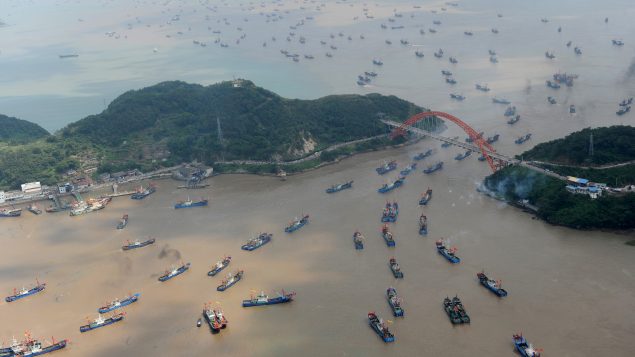Eye on the Arctic brings you stories and newsmakers from across the North
The end of the year is a time to take stock.
Here at Eye on the Arctic, it’s also the time when we check in with our bloggers who’ve spent 2017 following, and analyzing, Arctic news and events.
In this instalment of Eye on the Arctic’s annual Year in Review, we talk to our contributors about what got their attention, what took them by surprise, and whether there’s anything we in the media might have messed up along the way.
Up today is Mathieu Landriault, an Arctic expert and professor at Canada’s University of Ottawa.

Canada’s “excruciatingly long procurement process” when it comes to its new icebreaker was an important, but underreported, story in 2017, says the University of Ottawa’s Mathieu Landriault. (Courtesy Mathieu Landriault)
Eye on the Arctic: Good, bad or bumbling – how would you sum up general Arctic news coverage in 2017?
Generally good. There’s more coverage than ever. I’m in the marking season so I’d give it a B+.
What strikes people’s imagination is always the awkward, misinformed reporting that makes its way into some media outlets and creates a buzz. But people active on social media can correct or at least point out misperceptions about (the Arctic). I think it helps to correct, or at least flag, misunderstandings.
What were your two most important Arctic stories of the year?
1. Commercial fishing ban in the Central Arctic Ocean: Without a doubt, it’s the most important Arctic story of the year. We’re talking about an agreement between five Arctic nations but also China, Japan, South Korea, Iceland and the European Union, countries or entities, that didn’t have to ban commercial fishing from this area because it’s international waters. They are allowed to do commercial fishing in these waters, but they agreed that science must be a priority in the Central Arctic Ocean before they start fishing. And for 16 years. Just that number is astonishing. Sixteen years is an eternity in international relations.
2. China’s Xuelong icebreaker transits the Northwest Passage: The Chinese asked the Canadian government for permission. The American passages in 1969, 1985 created controversy and a national crisis because the Americans never asked us. They said it was international waters and they didn’t have to.
There’s often scapegoating of the Chinese government in Canada, but in this case, they had perfect behaviour. They even delayed the departure of their icebreaker to wait for the permission of the Canadian government, which I think is tremendous. The usual suspects in terms of fear-mongering try to present China as an existential threat to Arctic states, but in fact, their [behaviour] was exemplary. That’s really important.
What grade would you give the Trudeau government on the Arctic this year and why?
B+. Kudos on Indigenous rights and a more inclusive approach towards Inuit. Also climate change. Also kudos for not scrapping initiatives from the Conservatives, just because they came from Conservatives.
For example, the offshore patrol vessels announced by the Harper government in 2007. [The Trudeau government] could have “re-oriented” this but that didn’t happen. Also, the refuelling station at the east entrance of the Northwest Passage was announced by the Conservatives but wasn’t renounced [by the Trudeau government], so that’s a good thing.
I stopped short of an “A” because right now the government is consulting on a new Arctic policy. Liberals are pretty good at consulting but that’s not the final product. I’ll reserve my judgement until after the final product is revealed in 2018.
Was there any Arctic issue or event that you felt was overlooked, underreported and that just didn’t get the attention it deserved in 2017?
The excruciatingly long procurement process in Canada, more particularly in the case of the CCGS John G. Diefenbaker icebreaker. We have an icebreaker announced in 2008 by the Conservative government that was expected to be delivered this year. But it’s been pushed back to 2022, so a long way to go.
At a price that was once at $1.3 billion but at the end of September, and this didn’t get a lot of media coverage, we got reports that the icebreaker will not be delivered in 2022 and that it will cost Canadian taxpayers $1.5 billion or more. And we don’t know when it will be delivered, maybe 2024? I think taxpayers should mind that they’re paying $1.5 billion for something that probably should have cost $700 million. And by 2024, what will the status of ice cover in the Arctic even be? I think this whole story was underreported.
What will you be watching for in 2018?
Science: I talked about the commercial fishing agreement earlier. Some see it as a culmination of something, that that’s the end of it for 16 years. But in fact it’s just the beginning of something else: scientists trying to go to that area. The region is still hard to access and carry on research in. So it’s the start of a brand new process in which, I hope, Canada will play a pivotal role.
Trump: Any decision on the Arctic National Wildlife Refuge in the United States. We know that the Trump administration lifted a ban to exploit oil in that highly fragile ecosystem. So that’s something to watch.
Oil exploration in Arctic Russia: Russian teams tried to do some exploration to see if the resources were significant in part of their Arctic but they were pretty disappointed, for the most part, with what they found. In the year to come, we should look for more of these Russian oil companies, or joint ventures, looking if there’s any oil patch of significance that could be exploited in that area.
The above Q&A has been edited and abridged.
Listen here for more from our Eye on the Arctic interview with the University of Ottawa’s Mathieu Landriault:
Write to Eilís Quinn at eilis.quinn(at)cbc.ca








For reasons beyond our control, and for an undetermined period of time, our comment section is now closed. However, our social networks remain open to your contributions.